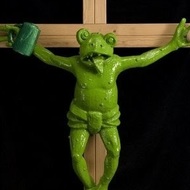Can an atheist be a proud Secular Christian?
By Admin • 5 years ago •
Thomas Jefferson had an interesting hobby. In his spare time, he would use a razor to cut out the things in the bible that were said to be spoken by Jesus and didn't contain religious hocus pocus. He called it "The Life and Morals of Jesus of Nazareth" or what's now called the "Jeffersonian Bible". As Jefferson was a strong advocate for the separation of the Church and State, he was interested in what could be consider common ground between believers and non-believers like himself. Jefferson saw value in the teaching and wrote, "A more beautiful or precious morsel of ethics I have never seen; it is a document in proof that I am a real Christian, that is to say, a disciple of the doctrines of Jesus."
For me, as someone who grew up in a devote Christian household, I spent a decade hearing stories and parables attributed to Jesus. When I later left the faith, I was often hostile to religion for the wrongs I perceived it did on me and on millions throughout history. However, as I've grown older and especially in recent years, I am more aware that I did benefit from the experience especially in how to treat those who disagree with me or could be consider enemies. The concepts of "love your enemies", "turn the other cheek", and "take care of others outside your tribe (good Samaritan)", while obviously not exclusive to Christianity, were taught to me in a Christian context. The phrase "Be like Jesus" or "What would Jesus do?" are shorthand reminders for me to try to be a better person... and something that to be proud of.What do you think?
Note: The views and opinions expressed in this article are those of the author and do not necessarily reflect the position of this website or its members.
Create your free account
 Amzungu
Level 8
Sep 6, 2020
Amzungu
Level 8
Sep 6, 2020
 RavenCT
Level 9
Sep 3, 2020
RavenCT
Level 9
Sep 3, 2020
 Lorajay
Level 9
Sep 3, 2020
Lorajay
Level 9
Sep 3, 2020
 redbai
Level 8
Sep 3, 2020
redbai
Level 8
Sep 3, 2020
 Fernapple
Level 9
Sep 3, 2020
Fernapple
Level 9
Sep 3, 2020
 HumanistJohn
Level 8
Sep 18, 2020
HumanistJohn
Level 8
Sep 18, 2020
 Bikes4Fish
Level 7
Sep 18, 2020
Bikes4Fish
Level 7
Sep 18, 2020
 anglophone
Level 9
Sep 3, 2020
anglophone
Level 9
Sep 3, 2020
 Cutiebeauty
Level 9
Sep 10, 2020
Cutiebeauty
Level 9
Sep 10, 2020
 Marionville
Level 10
Sep 6, 2020
Marionville
Level 10
Sep 6, 2020
 Secur
Level 5
Nov 22, 2020
Secur
Level 5
Nov 22, 2020
 The-Krzyz
Level 8
Nov 22, 2020
The-Krzyz
Level 8
Nov 22, 2020
 Desertcactus
Level 6
Sep 26, 2020
Desertcactus
Level 6
Sep 26, 2020
 TheGreatShadow
Level 9
Dec 3, 2020
TheGreatShadow
Level 9
Dec 3, 2020
 Aristippus
Level 6
Oct 25, 2020
Aristippus
Level 6
Oct 25, 2020
 Lizard_of_Ahaz
Level 9
Oct 21, 2020
Lizard_of_Ahaz
Level 9
Oct 21, 2020
 DavidLaDeau
Level 8
Sep 17, 2020
DavidLaDeau
Level 8
Sep 17, 2020
 ChestRockfield
Level 8
Sep 5, 2020
ChestRockfield
Level 8
Sep 5, 2020
 mariposalover92
Level 4
Oct 15, 2020
Write Comment
mariposalover92
Level 4
Oct 15, 2020
Write Comment
Enjoy being online again!
Welcome to the community of good people who base their values on evidence and appreciate civil discourse - the social network you will enjoy.Create your free account
31 comments
Feel free to reply to any comment by clicking the "Reply" button.I say absolutely one can be atheist, secular and still follow the basic principals found in the teachings of Jesus, thus considering themselves a Christian. More fundamental Chrstians would certainly disagree due to their belief in a Supernatural God and the designation of Jesus having been his son, but for those who do not believe in a deity, it fits together quite logically. I have read the Jefferson Bible and found it to be a relevant piece of work in encouraging that there is no need for a God in order to be a 'good human'. Whether or not Jesus actually existed, the teachings abscribed to him are rather unarguably a good set of precepts to follow if one seeks to be a kind, compassionate, forgiving human that has a positive and mindful impact on his fellow earth dwellars. One can simply view him among many wise teachers that came before our time and provided a guide to what is now more along the lines of a humanistic view on life, once all the dogma inherent in a belief in a God is removed. Simply because we have morphed those teachings into the supernatural and diety driven force of moralism that we now see in most religions, doesn't necessarily make the wisdom itself irrelevant.
I learned a lot more about being moral from seeing what the adults around me did for others - regardless of religious affiliations - than what I ever saw/heard in a church.
Frankly I think we can find far better ways of 'being' in present times without believing in the make believe (we have no proof Jesus actually existed and wasn't actually an amalgam of prior gods).
TST has some lovely tenets without being religious in the least (they're an atheist organization):
(BTW - These tenets require zero magical thinking - and not a lot of memorization to figure out what might lead to a better life for everyone).
There are The Seven
FUNDAMENTAL TENETS
I One should strive to act with compassion and empathy toward all creatures in accordance with reason
II The struggle for justice is an ongoing and necessary pursuit that should prevail over laws and institutions.
III One’s body is inviolable, subject to one’s own will alone.
IV The freedoms of others should be respected, including the freedom to offend. To willfully and unjustly encroach upon the freedoms of another is to forgo one's own.
V Beliefs should conform to one's best scientific understanding of the world. One should take care never to distort scientific facts to fit one's beliefs.
VI People are fallible. If one makes a mistake, one should do one's best to rectify it and resolve any harm that might have been caused.
VII Every tenet is a guiding principle designed to inspire nobility in action and thought. The spirit of compassion, wisdom, and justice should always prevail over the written or spoken word.
Secular is defined as values which are without any religious basis. Calling someone a secular Christian is like calling someone an ethical bank robber.
The universal value of doing unto others as you would have them do unto you is present in almost every known religion. I still remember and Episcopal friend of mine that we helped clean up her yard after a bad ice storm telling everyone that Kenneth and I were the best christians she had ever known and she knew I was an atheist. She meant it as a compliment but you cannot be a secular Christian. You can be and ethical atheist though.
@TheMiddleWay
I think you're playing word games here and I think you know it. You're not a bank robber if you work for the bank testing security and don't steal anything (or intend to steal anything).
@Admin
Let's pretend her analogy was 'ethical serial rapist'. She probably didn't feel the need to go that dark, but it seems to solidify her point. I personally don't think there are any number of 'good deeds' one can do to mitigate that.
@Lorajay
Almost all children are just like almost all other types of people: basically bad. Have you seen how they behave to each other? And that's when they have to power, no needs they have to meet on their own, and generally no stressors. It is because of that, that I can completely agree that children who behave 95% of the time would be a reason to believe in miracles.
@TheMiddleWay
Wikipedia disagrees with you.
@TheMiddleWay Ethical hacking may be a thing, no one said it wasn't. But I think her point was that robbing banks is not ethical. And "ethical bank robbing" isn't robbing a bank any more than killing someone in virtual reality is murder. You're adding a word to it which necessarily changes what the thing is. If I add 'vegan' in front of 'cheeseburgers' we're no longer talking about the same thing we were before.
@TheMiddleWay So then he's not a bank robber he's an ethical-bank-robber. We are having major communication issues this evening. Look at what you said in your reply.
Yes, I am adding a word that necessarily changes the whole thing
and
Hence adding ethical in front of bank-robbing modifies bank robbing
Does it modify it, or does it necessarily change the whole thing? 'Cold' modifies soda, 'empty' completely changes it.
@TheMiddleWay
Nope. There must have been an update today because the reply button swirls now. @Admin aware of the quote box glitch?
Also, I missed the magazine thing. How does that all work? Do you have to submit something to be an article?
And is there a list that shows how to make all the text styles like bold and strike through?
How about it @FearlessFly @Fernapple? Can you figure this out for us?
@JeffMurray . . . until it was mentioned, I had been oblivious to the existence of the quote button
I haven't noticed anything odd about 'Reply'.
I have 'reported' "Report" not apparently working, and that I'm not getting expected alerts.
@FearlessFly Thank you for that info.
Any thoughts on calling someone a bank robber when their job is ethical-bank-robber?
@TheMiddleWay Those are not real bank robbers or real hackers.
@JeffMurray I would call them a 'pen tester'
@TheMiddleWay, @JeffMurray I Disagree that most children are bad or that most people are.
I think nvironment and socialization often creates so called bad actions in children. I had 2 children and I watched them navigate through their environment and the people they were exposed to. Yes I probably had an excuse for each of their bad actions but I still think that people are intrinsically good when given the opportunity.
@TheMiddleWay But the intent and actions aren't the same. The intent of a bank robber is to steal money, the intent of the ethical version is to test security to defend against theft. The actions of a bank robber are to remove money, most often at the threat of harm or death, and keep that money as a source of income. The actions of the ethical version probably involve some similar characteristics, but without the permanent removal of funds for personal gain.
@Lorajay
A lot of people disagree with me on that, so I'm not surprised. I believe all people (including children) are intrinsically bad. People are selfish and greedy, and need only the right motivation and opportunity to reveal it. The more advantageous the bad act is and/or the less risk involved, the more likely any given person will take advantage. The "less badness" of a person is judged (by me) by how great the advantages and low the risk has to be before it motivates a bad act.
@TheMiddleWay NO YOU DIDN'T!! I'm not disagreeing just to disagree. You just said:
.
.
.
.
the actions are the same, but the intent is different.
I think if you had non-Christian parents they would have found other stories and phrases to instill the same values that you have now, you know, like the billions of families that aren't Christian that find a way to do it anyway. The idea that the Bible is a way of teaching morals and ethics or how to treat other people can only be assumed by a cursory reading of the book. Which explains why most Christians use it as such.
And maybe more importantly, the parents used their own moral compass to decide what in the Bible was something they should teach while likely leaving out all that inconvenient shit about killing your children or selling them into sexual slavery.
Since there are so many different forms of Christianity, it is a virtually meaningless term and can therefore be anything you want it to be. So that if someone, like everyone else, wanted to cherry pick out the bits they like and then call that Christianity, then they are no different from anyone else, and are perfectly entitled to call themselves a Christian if they wish. Personally if they believed in "love your enemies", "turn the other cheek", and "take care of others outside your tribe (good Samaritan) " I would probably call them simply a, good person instead, because I think that they are better than that religion. Or even better than Jesus who if we take the New Testament as half true, also said some really horrible things.
No, there is no such thing as a secular xian.
Firstly, you don't need the (supposed) words of jesus to be a moral person.
Secondly, when you do that (taking passages that you like) you're simply doing the same thing as the scamgelicals- picking-and-choosing what sayings suit youy.
Thirdly, according to paul, you have to believe in the resurrection to be a xian.
Fourthly, to be a xian, you have to accept the old testament. Do you really want to do that?
The person in question would have to remain ignorant of the preceding 2,500 years or so of recorded history. He or she could just as easily be a proud Confucianist or Taoist or Hammurabist or Hindi or Zoroastrian as all or most of the doctrines attributed to Jesus were already codified in older texts and/or passed down through oral traditions. I suspect that most proud Christians are ignorant of the history of the ideas they believe originated with Jesus. In the end, being a proud any kind of Christian looks like little more than brand loyalty - like being a proud Tide laundry detergent user vs. a proud Cheer laundry detergent user
A Christian is atheist about the other 4,999 or so gods that are floating around.
I voted yes.. The way Jefferson did this with the bible is very interesting...
I have voted no...because the morality and the examples shown by Jesus Christ did not originate with him, he in fact adopted an empathy and morality towards others that was already inherent in humans. It is an admirable philosophy of philanthropy and compassion, and an ethos of caring for others than I wish more people, whether Christian or not, would adopt, but it did not originate with him. Unfortunately, it is impossible to single out the teachings of Christ and leave the rest of the baggage being a Christian comes with, and for that reason I cannot agree with the premise that it’s possible to be both an atheist and a secular Christian.
I vote no, Christianity is nothing but lies.
King David existed. And there is some truth about eating from the tree of knowledge. Enslaved Jews in Egypt outside the bible? Romans putting a hit on Jesus (never mentioned in one record ever and they recorded everything). I think the jeebus thing would have made it into some other work somewhere...
@TheGreatShadow Rave on Avon, the entire Goat-herders Guide to the Galaxy has absolute NO foundation/s in historical factuality what- so-ever.
@TheGreatShadow : Please expand on this supposed truth about the tree of knowledge.
They may not use that label, but I think most of the people on this site fit that category: Having ditched the theological/“god” part of Christianity, they still often uncritically embrace the moral/ethical ideas for which the Jesus character is the front man.
Morals have nothing to do with Christianity. There are many different reasons, some choose religions, others karma or energies, and there are still other ideas that demonstrate or explain our need for morality. Pick whichever you choose as long as you pick something to motivate your morals!
That's why I use "spiritual not religious". I get crap for saying that, but whatever. I am an electronics nut. Energy can only be converted, not created or destroyed. So to me god is electricity. We know it exists. We can't see it either. The only reason why we know it does is because of the after effects of something else. So I guess both are believeing in something you can't see?
Good write up! Also was it cut with razors? Did they exist at the time? We do know he wrote that book, that's not my point, I'm just curious.
Please use another photo other then this demented creep. It's surreal and offensive.
It doesn't work that way.... Jefferson was a believer he just didn't think of Jesus as the son of a god his beliefs were more in line with Muslims who speak of that imaginary being as a Prophet instead.
An atheist can not be a proud secular Christian as these are mutually exclusive. One can try to be a good person (be a good Christian in the colloquial sense) but that is a cultural nuance. Just because a particular belief system claims to have moral standards does not make the standards moral nor does it make a particular belief system the origin of morality.
I understand the cultural equivocation but that cultural equivocation is not objective.
Just another note. President Jefferson did believe in the separation of state and government as he put it.
His idea was almost the opposite of what it is understood to be today. He believed that government should not interfere with religion. He never said that religion should be banned IN the government. I am however very glad that we have it wrong!
In this video I go into further detail about the subject.
Love the shirt. Should 45 prevail then I would, again and more forcefully, advance the idea that the remaining 3 years of AntiChrist rule has begun. Those Jews who follow Christianity will allow non-Jesus Jews to be shot in order to bring the prophecy into reality. Only the converts will be left.
I heard that Hitler was a stickler for dining etiquette and table manners, so since many learned those habits in that context, I suppose we should call them polite or dignified Nazis.
You can use shorthand like this, but you're going to waste more time on all the invited questions than it's worth.
@Admin I know you're just kidding, but to be fair, the article kinda stated the opposite of that.
The concepts of "love your enemies", "turn the other cheek", and "take care of others outside your tribe (good Samaritan)", while obviously not exclusive to Christianity, were taught to me in a Christian context.
So even if table manners were common place, the Hitler youth that learned them in that context...
I was mostly joking, but kinda making a little bit of a point.
@Admin Oh, and is the quote box bug fix in the works?
What about a proud secular Muslam, Jew, Hindu, Shinto, Buddhist, etc. If you grew up with religion whether it be Christianity, Islam, Judism, Buddhism, Hinduism, Shintoism, Taoism, Unitarian Universalism, or whatever, it's part of who you are. Yes you grew up, moved out and decided not to practice religion anymore but you still did it as a kid (not that you wanted to of course 











